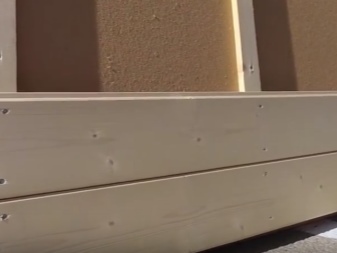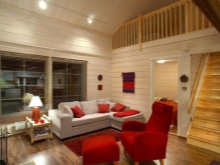Sizes of imitation of a bar

Not every family can afford to build a house from a bar. But everyone wants him to be beautiful. An imitation of a beam or a false beam helps out - a building material for decorating the facades and interiors of low-rise buildings and summer cottages. In fact, this is a planed sheathing board, processed on four sides and profiled under a bar. Outwardly, it practically does not differ from a bar, but much cheaper. False beams are made from coniferous wood and are connected to each other by means of a thorn-groove system.


Dimensions for external finishing
In order to obtain a facade that is indistinguishable from walls made of profiled beams, not any material is used, but strictly defined sizes, otherwise the house will look the same as if it was trimmed with clapboard.
On the Russian market, false beam is offered in various standard sizes. Its length reaches 2-6 m, width ranges from 90-190 mm (for profiled timber - 150 and 200 mm), thickness is 19-35 mm, the most popular is 20 and 22 mm. There is also a false beam on the market with a thickness of 16 and even 14 mm, but such dimensions are not standard, and it is more difficult to find them.
The choice of the thickness of the board also depends on the conditions of future operation, that is, on the climate, because it is on the outer side of buildings that all the blows of the elements fall. From this point of view, when choosing the thickness of the board for finishing the external walls of a house in central Russia, it should be borne in mind that it should not be less than 19 mm. Experts recommend choosing sizes 25-30 mm for this purpose.... It is not surprising, therefore, that the house after finishing seems to be larger in size.


For cladding the facades of houses, boards with a width of 185-190 mm are usually used.... The length is determined by the width of the house, usually 6 meters. But if this is not enough, the joints are covered with a film that is matched to the color of the house or painted. Most often, for the exterior decoration of houses, an imitation of a bar is used with the following dimensions: width -190 mm, thickness - 35 mm, length - 2-6 m. But during installation, material of this length causes difficulties due to its heavy weight.
The decoration of ventilated facades is often carried out with an imitation of a bar made of pine 18x190x6000. At the same time, special skills, special tools and knowledge are not needed - the thorn-groove design is extremely simple. The main thing is to set the lower row of the false beam exactly at the level. If this is not done, a distortion is possible, which will require alteration of the entire skin.
Imitation of pine timber with dimensions 20x140x6000 looks like a natural timber of a beautiful pinkish color... It is a popular material with a high density wood structure and a reasonable price. The disadvantage of this material is its high flammability due to its resinousness.


Longitudinal grooves in the boards provide ventilation of the premises and reduce stress in the general array of finishing material, preventing cracks.
We must not forget about mechanical strength: width and thickness should be proportional to each other. The current standards declare the optimal ratio of the width (W) and thickness (T) of the board: W / 5.5 = T. Based on this, imitation of a bar with dimensions of 180x30 mm, which can be found on sale, does not have the necessary strength. This must be taken into account when choosing.
In order not to be mistaken when choosing an imitation of a bar, you should know what the correct designations look like. Imitation of a bar with a working area of 185 mm, 20 mm thick is written as - 185x20x6000. The spike size is not included in the calculations.
If the task is to decorate the house, imitation of a bar with dimensions of 185x20x6000 cannot be used! The thickness of this material is not suitable for such work.Even a specially treated board under the influence of the environment - rainy or hot weather, changing seasons - can warp in the middle or pull the spikes out of the grooves, which will have to go through the entire wall.


Dimensions for inner sheathing
Internal cladding with wood makes the interior of the house warm, luminous and very cozy. For the interior cladding of premises, experts advise choosing a false beam thickness of 16-22 mm, a width of 140 mm. The material of such dimensions looks much better than, for example, boards with a width of 180 mm: when using a wide false beam, the room visually decreases. In addition, experts note that if you decorate a small room with such a board, the curl (winding arrangement of wood fibers), which determines the beauty of the material, becomes unnoticeable. The texture of wood ceases to look advantageous and, accordingly, the effect of wood finishing, its warmth and comfort, is felt.
The most popular imitation timber dimensions for interior decoration are: width - 135 or 140 mm with a thickness of 16 or 20 mm (135x16 and 135x20 or 140x16 and 140x20 mm), and for small rooms - 11x140 mm. It is difficult to distinguish rooms trimmed with a false beam of such dimensions from those built from a profiled beam of 150x150 mm. In industry, a material of this width has a thickness in the range of 16-28 mm, an economical solution is 16x140x6000. When making a calculation, it must be borne in mind that the working width of a false beam with a dimension of 140 mm is 135 mm (5 mm is the width of the groove). If you are in doubt about which thickness to choose for a given width, remember that the ratio of thickness to width of the panel 1: 5-1: 8, with sufficient strength, will significantly lighten the board, and therefore the entire structure. At the same time, inside the room, the high strength of the board, as in the case of facade cladding, is not needed.


For interior decoration of premises, boards with dimensions of 150x20x6000 mm are also suitable. False beam with a working area of 140 mm, 20 or 16 mm thick is designated as follows: 140x20x6000 or 16x140x6000. In this case, the spike in the offset of the area of the board is not accepted in the same way as the calculation of the material for external wall decoration.
To save material, the calculation of its amount is done in such a way as to reduce the number of joints during finishing... However, for wall decoration this is not so important, since the joints can always be hidden behind furniture, paintings, and other decorative elements. But on the facade, the joints cannot be hidden, and on the ceiling, too. In order for the joints to look artistic, the length of the imitation of the timber is carefully chosen - for rooms, preferably 2-4 m, and the installation must be calculated from the window. If you plan the joints, then you need to mount the boards with a ladder or herringbone, alternating the seams and the middle of the next board.


If it is necessary to finish a large section of the wall, it is recommended to use an imitation of a timber with dimensions of 20x190 mm (20x190x6000). Material of this size is most in demand today by customers, since it allows installation on walls of different configurations.
When finishing a large section of the wall, the following dimensions allow minimizing waste:
-
20x135x6000;
-
28x190x6000;
-
20x140x6000;
-
20x145x6000;
-
35x190x6000.
But the most popular is the length of the bulwark of 4 meters. Boards for finishing ceilings should be relatively light, small thickness, optimally 13 mm


The value of the thickness and width of the imitation of the timber and their ratio affects the natural processes inherent in wood material and occurring in nature - swelling and shrinkage with changes in humidity and temperature extremes... For the exterior cladding of a house, boards with a width of 190 mm have proven themselves perfectly with a thickness of 28 mm (198x28). So, the use of a false beam from pine 190x28 AB when facing the facade of a house will postpone repairs for several decades.
If you do not follow the ratio of the thickness and width of the imitation of the timber, their deformations in the finished coating in the form of twisting and bending by the "boat" are possible. Russian enterprises produce false beams up to 250 mm wide.



What size should I choose?
Summing up the above, the following nuances can be noted.
In the external facing of houses, experts recommend choosing boards with a section of 185x25x6000... They are durable and look like a real timber. They need to be placed horizontally to protect the seams from moisture. The thickness of the boards of 30 and 40 mm is also possible, but it has been noticed that under the influence of natural phenomena, a profiled board of this size, as a rule, cracks. And processing the material with special septic tanks will not exclude, but will only delay this trouble.



Internal wall cladding looks beautiful when using material with dimensions: thickness 11-20 mm, width 135-145 mm, length 4000 mm. The dimensions of 20x145x6000 or 20x146x3000 mm will help to save money. The possible arrangement of the boards is horizontal and vertical.
For finishing ceilings in order to reduce the weight of the structure and reduce the number of joints, it is better to use boards of small sizes - up to 13 mm thick and 2-3 m long. You can create a unique pattern from them - a herringbone, a ladder and others. Fantasy is not limited here.



For the dimensions of the imitation of the timber, see the video below.













The comment was sent successfully.